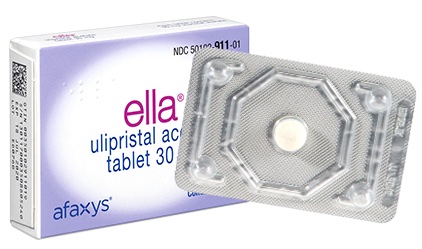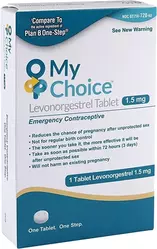What is a Morning After Pill
You may be wondering now more than ever what is a morning after pill due to the recent overturning of Roe v. Wade. The morning after pill is an emergency contraceptive to prevent pregnancy after unprotected sex or when your regular birth control method has failed.
There are two types of morning after pills approved by the FDA, ella (ulipristal acetate), which requires a prescription from a doctor, and a levonorgestel-based pill that can be purchased OTC without a prescription with common brands being Plan B, Option 2, Preventeza, AfterPill, EContra, Aftera, My Way, and more.

ella: Ella emergency contraceptive pills require a prescription and are the most effective morning after pill. Ella contains 30 mg of ulipristal acetate, a synthetic progesterone agonist/antagonist which postpones ovulation when taken. Taking the ella contraceptive must be done within 120 hours, or 5 days, after having unprotected sex.

OTC emergency contraceptive pills: OTC morning after pills contain 1.5 mg of levonorgestrel, a progestin-only (synthetic progesterone hormone) medication which prevents the ovary from releasing an egg. OTC pills must be taken within 72 hours, or 3 days, after having unprotected sex.
Dysmenorrhea: Causes, Symptoms, and Treatments
How Does Plan B Work?
The morning after pill works by temporarily not allowing your ovary to release an egg. After taking a pill, a high dose of progesterone is delivered to your body which blocks ovulation and prevents an egg from attaching to the uterus so it cannot meet with the sperm alive.
The only way to know if the morning after pill was successful is to take a pregnancy test or wait to see if your next period comes. Delays, irregular periods, and spotting are to be expected. While the morning after pill is highly effective, if your period does not come within 1 to 2 weeks of its normal cycle you should take a pregnancy test or consult with your doctor. The pill will not eliminate a pregnancy that has already been implanted. Taking the morning after pill works by delaying or preventing ovulation.
Does Plan B Work?
The morning after pill is a very effective method of reducing the risk of pregnancy as long as it’s taken within the time frame. While pills have different time limits, it’s best to take the morning after pill within three days of having unprotected sex for maximum efficiency.
Plan B has a 95-99.4 % success rate.
ella has a 97.9-99.1% success rate.
There are some studies that show emergency contraceptive pills may not be as effective for those over 165 pounds or with a BMI of 30 or higher. If you are over this weight ella may be the better option but it’s best to consult with your doctor first.
How Long Do You Have to Take Plan B?
Taking both types of morning after pills only require one dose after the event of unprotected sex. There are some circumstances that may require one to take a second dose but generally the FDA doesn’t recommend taking the pill more than once during a menstrual cycle.
There is no evidence of harm caused from repeated use of the morning after pill, all though doctors don’t recommend using it regularly as birth control due to it being less effective than regular birth control methods, is more costly, and can cause irregular periods.
How Much Does Plan B Cost?
ella $40–$68 for one tablet
Plan B $40-$50 for one tablet (generic brands are usually cheaper)
The Affordable Care Act state many health insurance plans should cover the cost of FDA-approved emergency contraceptive pills. Check with your insurance as they most likely will cover the cost.
Where To Get The Morning After Pill
Most drug stores and pharmacies like Walgreens, CVS, Walmart, Target, etc will carry the morning after pill. You can also go through online, tele-health birth control services like Nurx, Pandia Health, and Simple Health or purchase through online sellers like Amazon.
What Are The Side Effects of Plan B
All though the morning after pill is generally considered a safe and effective emergency contraceptive method, there are some risks and side effects that may occur. Both types of morning after pills can delay your period or make it come sooner than expect. Nausea is also a commonly reported side effect as well as headache, fatigue, dizziness, mood swings, and tenderness of the breasts. These side effects should only be short term. If symptoms last more than 3-4 days you should speak to your doctor.
The FDA does not recommend people who are pregnant, breastfeeding, post-menopausal or those who haven’t had their first period yet to take emergency contraceptive or to at least consult with your doctor first. There is no evidence that taking the morning after pill will cause infertility or an increased risk of ectopic pregnancy.
If you are on other medications it’s also wise to discuss with your doctor before taking any emergency contraceptives.
Is Plan B Legal?
Plan B and other emergency contraceptives are still legal in all states. Even with the overturning of Roe v. Wade, Plan B has not been banned all though some lawmakers are campaigning to put stricter measures in place. You should be able to get a non-prescription OTC emergency contraceptive at your local pharmacy, as well as the ella contraceptive with a doctor’s prescription.
Also Read:








